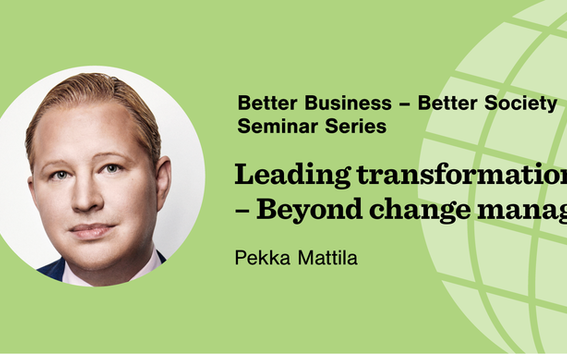Change can only succeed with the people on board

Traditional change management has become general management. What it all comes down to is how things are being done. Today, all organisations are in a state of constant turmoil, which has become the ‘new normal’. Why, then, are certain organisations doing so much better at implementing change than others? In some organisations, productivity is decreasing, leading to wasted resources, while others show themselves capable of change. This is largely due to how resilient an organisation is in the face of change.
‘Change should be viewed through the eyes of people rather than through the organisation chart. Managers, of course, are often in their comfort zone when they get to draw structure and process diagrams, because those are easy to manage. But where does the impact actually come from? It comes from people understanding how to see the value of the new direction on a fundamental level, and choosing the new together. It is a learning process to work directly with the people, but doing so would significantly help many large organisations in particular to do better in different situations of change,’ says Professor of Practice Pekka Mattila.
When things become established in culture, the need for supervision and control is eliminated
As CEO of Aalto EE, Pekka Mattila has coached and advised over 300 organisations in the Nordic countries, Africa, Asia, and North America. He feels it is useful to recognise the key points that all organisations going through large-scale changes have in common.
The essential thing is to understand how the cycle of change starts. Pekka Mattila says that change often originates from the top and from organisational structures. New things, such as tools or processes, are then introduced. This is followed by a stage of experimentation, which is marked by loss and pain. During this stage, people feel the change is for the worse, and that the old way of doing things was better. Nonetheless, through repetition, a routine gradually begins to emerge.
During this stage of routine, people start to see the new way might actually be a faster, more reliable, or higher-quality way of doing things. In the stage of routine, people will, however, still follow the new way only because they are under supervision, and have no choice. ‘If we don't follow the rules, we might get in trouble.’
The highest level in the ability to change is when the new becomes a natural part of culture, and doing things the new way becomes the new normal.
‘At this highest level, we no longer do things in a certain way only because we have to, but because it is good and right and we want to do so. To do things in a different way would even be a little embarrassing. At that point, there is no longer a need for supervision or control. And that is why culture is the cheapest and most effective management system. You don’t need reports, intermediate management, or cameras in the ceiling, because the discipline and order come from within the people,’ Mattila says.
Pekka Mattila says few organisations do well at establishing new culture. The way to succeed at this is by celebrating victories together – on a small scale when the victory is small – and mourning together when the new has led to a failure from which people can learn.
‘We must be able to mourn our disappointments together. Refusing to face the situation doesn’t work. You need to be able to learn from setbacks together.’
For more information about Better Business – Better Society seminar series
Professor of Practice Pekka Mattila was interviewed by Terhi Ollikainen.
Read more news

Significant donation to boost pavement engineering research and education
Companies and associations in the field have donated €400,000 to the School of Engineering.
Design strengthens industrial competitiveness – human-centered factory work at the core
Factory work is undergoing a transformation: new technologies and artificial intelligence are changing the content and roles of work. Aalto University’s Department of Design is studying this change from a human-centered perspective in the HiFive project.
Learning to slow down: cold-water swimming benefits explored in new study
Swimming in cold water offers a temporal slowdown, promoting stress management and mental clarity that lingers long after the experience, says research from Finland.






